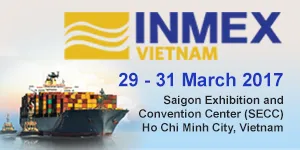
NOC Seminar Series at INMEX Vietnam
(or see us on Stand H20)
29 March - 14:00 to 15:00
30 March - 09:30 to 10:30
31 March - 09:30 to 10:30
Seminar Room @ SECC Hall A1
Refreshments and networking included
Using NOC Science, Technology and Specialist Facilities to improve business, Kevin Forshaw, NOC Associate Director
The National Oceanography Centre produces world-leading research outputs, supported by technological developments that have driven innovation in Marine Autonomy and Sensor systems. This session will highlight and explain how we work with business to help them embrace opportunities and tackle issues affecting their sector. Specifically it will discuss how the NOC can be a research partner, license its technology, and apply its leading knowledge and facilities to company developments. The presentation will also include many examples of the collaborations to date, which will include new product developments that we have helped to achieve, and enhanced capabilities that have allowed companies working in offshore sectors to develop safer and more sustainable operations.
Marine Geoscience: resources, hazards and climate change impacts, Dr Angus Best with Robert Gatliff, (British Geological Survey)
Marine Geoscience research at NOC seeks to understand fundamental seafloor processes and the value of the seafloor, particularly in relation to natural resources, geohazards and climate change impacts. Our mission is to provide the best scientific knowledge to inform decision makers wishing to exploit the seafloor environment and promote sustainable practices. We have a history of developing new methods and technologies for observing the seabed and subsea geology, from the continental shelves to the deep ocean, to underpin studies of seafloor habitat mapping, geohazards, and non-living resources.
People and oceans: environmental coastal zone impacts from global changes, Dr Laurent Amoudry
Shelf seas, the shallow seas closest to our continents, account for over 80% of fisheries productivity and are relied upon by society for transport, energy and leisure. Half of the world’s population lives within 60 km of the coast, which is at an ever increased risk of flooding and erosion due to climate change and sea level rise. The NOC studies the processes and fundamental interactions operating on the continental shelf, from the coast up to and including the shelf break. Our work is the foundation for comprehensive models of the physics, chemistry and biology of shelf seas, which are used to predict the impacts of climate change and to help policy-makers meet directives on good environmental status. We combine observations and numerical models to improve our knowledge of sediment transport processes so that we can better predict estuarine ecosystems and the morphology of coastal zones over several decades. We also study the exchange of nutrients and carbon at the shelf break, and the potential impacts of marine renewable energy installations.
The NOC is also a centre of excellence for sea level research, coastal flood forecasting and the analysis of sea level extremes, including interpretation into advice for policy makers, planners and coastal engineers. It also hosts the Permanent Service for Mean Sea Level (PSMSL) which has been responsible for the collection, publication, analysis and interpretation of sea level data from the global network of tide gauges.
Ecosystem and biogeochemical data-led solutions to global problems, Dr Claire Evans
The Ocean Biogeochemistry and Ecosystems Research group employs state-of-the-art approaches to better understand how to safeguard the services provided by the marine environment, while facilitating sustainable commercial activity. To achieve this we work in partnership with stakeholders from around the world, ranging from governmental bodies to industrial enterprises. Via these synergistic relationships we are able to deliver cutting-edge solutions to key problems. For example, close collaboration with the oil and gas industry allows us to provide information on the impacts of drilling operations as they happen. Food security is another key priority area and we are addressing the global challenges of sustainable aquaculture and enabling the protection of fisheries by better understanding the occurrence of harmful algal blooms. Importantly our work encompasses establishing the socioeconomic trade-offs of marine and terrestrial environment uses for marine-dependent industries, which may be degraded by the introduction of pollutants, nutrients, sediments, and non-native organisms.